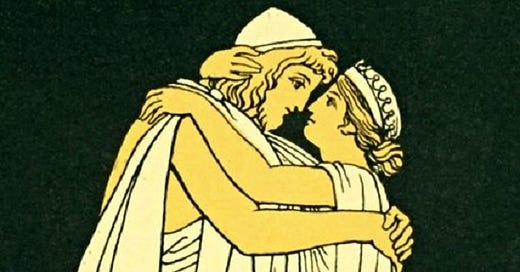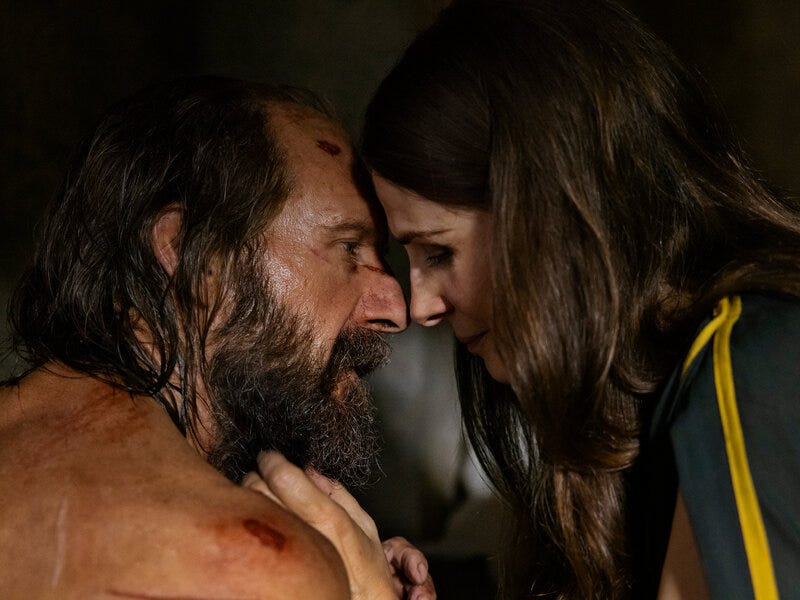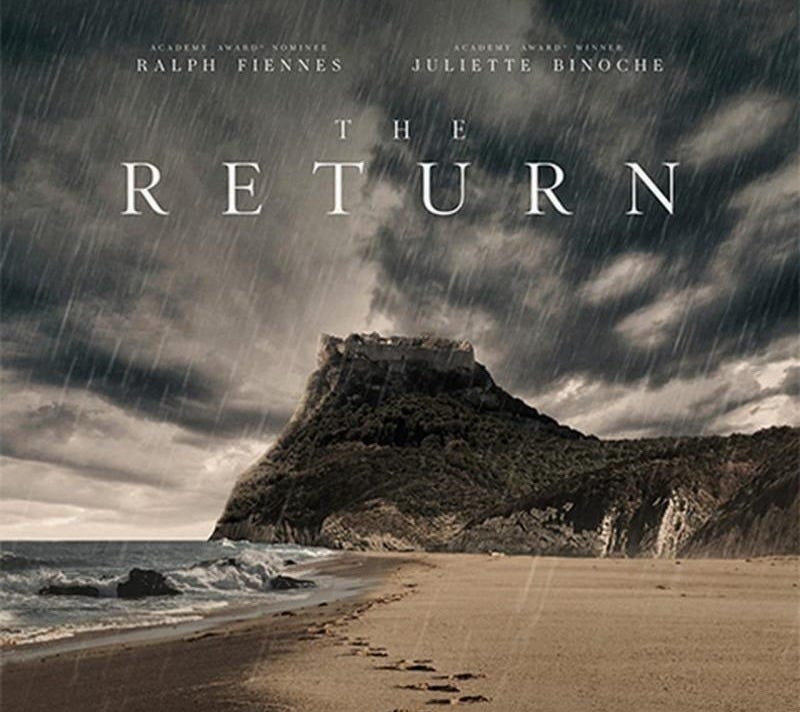I saw The Return last night, a new film about Odysseus’s homecoming to Ithaca. It stars Ralph Fiennes and Juliette Binoche. I’d been looking forward to it since the start of the year, but leaving the theater, I was mostly underwhelmed by everything but the beautiful locale and production design. I’ll have some more thoughts after I sit with it.
The trailers sold the film on three things: (1) bloody retribution, (2) Fiennes’ bronzed and sweating physique, and (3) the relationship between Odysseus and Penelope as the emotional core of the film. Only number 2 is fulfilled, surpassed even, as we get to see Fiennes in all his full frontal glory.
And though the actors are class acts, their relationship in the film is severely underdeveloped, which is a shame, because I went back and read the sections in the Odyssey the film is based on, and there’s so much that was left on the cutting room floor. But isn’t that always how it goes with book adaptations?
It’s been said that Odysseus and Penelope’s relationship is characterized by homophrosyne (ὁμοφροσύνη). The word means “like-mindedness.”
Odysseus first uses the term in Book VI when speaking to the princess Nausicaa.
And may the gods accomplish your desire:
a home, a husband, and harmonious
converse with him—the best thing in the world
being a strong house held in serenity
where man and wife agree. Woe to their enemies,
joy to their friends! But all this they know best.1
A good marriage, Odysseus says, is one in which husband and wife share a mutual understanding. The two know what the other is thinking. Their harmony is a consequence of their shared feelings, thoughts, and aims. Odysseus and Penelope embody this ideal, as each, unsure of the other’s fate, nevertheless holds out hope of reuniting.
I also take homophrosyne to mean “similar in personality,” as Penelope is a counterpart to clever Odysseus. Equally wily, equally cunning, she tricks the suitors for years and delays her choice of a new husband by weaving and then unweaving a burial shroud. And when that fails she, ever resourceful, comes up with the impossible task of stringing her husband’s bow and shooting an arrow through the holes of ax heads.
When she realizes her husband might have actually returned, after the suitors are slaughtered and she stands before him, she devises a trick to make sure it’s actually Odysseus.
And she, for a long time, sat deathly still
in wonderment—for sometimes as she gazed
she found him—yes, clearly—like her husband,
but sometimes blood and rags were all she saw.2
Their son is shocked she won't embrace him right away, but Odysseus says, “Peace: let your mother test me at her leisure.” And she does test him. She stays aloof, distant, as he’s washed and cleaned. She tells her maids to move their marriage bed into the hall for him to sleep on. At this Odysseus is piqued. “What have you done to our bed?” he cries out.
It’s one of the most famous scenes in the book, and it shows, once again, how similar Penelope is to her husband. I take it to be more teasing than testing, as she probably would've recognized Odysseus as he bathed. She would've noticed, as their nurse Eurycleia did, the scar he'd gotten from a boar. The marriage bed is more like play, just as Odysseus plays with his father later on, disguising himself at first, then revealing his true identity. She knows it’s going to get a rise out of him, and that’s exactly what she wants. She enjoys riling him up. And after she does, after they’ve settled into their old, familiar ways, they can finally embrace again as husband and wife. The two are truly “like-minded.”
I wrote my own version of the scene, because I love it so much, for a book of poems called The Philosopher, The Poet & The Politician. I’ve included it below.
If you like this one, there’s also another one I posted awhile back, on Odysseus’s final task upon returning to Ithaca.
Homophrosyne: The Marriage Bed
She’s come downstairs twenty years later
and there he is like the end of a holiday.
She cannot make herself believe it,
cannot make herself see what in the flesh
for so long she hid away in memory.
Her son calls her cold for not
embracing him right away like
parted lovers do in all the stories.
Give your mother a break, he says.
I know what it is to see ghosts.
Besides they’ve a hundred bodies
in the further room and might soon
play host to angry, vengeful mobs.
He takes a bath, cleans himself up,
and she, from the opposite wall,
watches him become her husband again.
The mud and filth, sweat and blood,
slip into water steaming from the tub.
His hair cut, his beard trimmed.
His body, rubbed in golden oils, dons
the clothes she’d kept fresh for him.
And he, every so often, lifts his eyes
like a wounded, bashful thing,
to cross her deathly quiet stare.
Nothing? he asks, feeling the sting
of perhaps not being recognized.
Too many times have they been
betrayed by hope. But she knows.
Knows the scar a boar made in him
on Parnassus many years ago.
Now it’s only a question of how best
to play with, to put him to the test,
as he’ll do later on to his own father
before revealing himself.
Nurse, make a place for me to rest.
I’ll sleep on the couch tonight.
My wife has iron in her breast.
She says no why doesn’t he use
their bed. She can have the girls
move it to the living room instead.
Move it? Woman, what’ve you done?
I fashioned that thing from the trunk
of an olive tree still rooted deeply
in the earth. Four months it took me
to shape the stump into bedposts,
to wall off and roof it, and fit doors
and tan and dye the oxhide crimson.
I swear if it’s not there anymore…
You’ll what? she dares, hands on hips.
O, do they not make such a fine pair?
He cannot keep the ends of his lips
from lifting into a smile, and only
after she’s teased him do they
embrace and cry and laugh awhile.trans. Robert Fitzgerald.
ibid. Book XXIII







Really good stuff! I've read the poem(s), now I guess I need to see the movie.
Your article reminded me of an old Wallace Stevens poem, one of my all-time favorites: https://www.brinkerhoffpoetry.org/poems/the-world-as-meditation
Oh Robert, you are ever so good..! I love thé poem, it’s teasing cadence, the back and forth lilt of it - it puts me in the boat sailing to Ithaca! I love the last line. Really interesting piece…